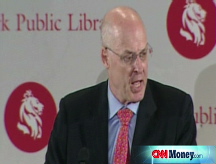Dollar hits two-week high vs. euro
The U.S. currency is driven up by apparent weakness in the European economy and falling oil prices.
NEW YORK (CNNMoney.com) -- The dollar jumped to a two-week high against the euro Wednesday, spurred by falling oil prices and apparent weakness in the European economy.
The 15-nation euro fell to $1.5690 Wednesday from $1.5945 late Tuesday, after a two-week trading low of $1.5671 earlier in the day. The dollar also rose to ¥107.88 from ¥106.75.
Euro-zone economy: New industrial orders in the 15-nation euro zone fell 3.5% in May, according to a report released Wednesday, adding to concerns that Europe's economy is running into serious problems.
"The euro-zone economy is coming to a grinding halt right now," said Boris Schlossberg, currency strategist with Forex Capital Markets.
The dollar may be set for another bump Thursday, as investors focus on two key European economic reports that are expected to illustrate further euro-zone weakness.
Economists expect Germany's Ifo Business Climate Index - scheduled for release at 4 a.m. ET Thursday - and the upcoming euro-zone PMI Index to show declines.
Oil slips: Meanwhile, oil prices, which have plummeted more than $20 a barrel over the past several days, continued to fall, dropping below $127 a barrel on Wednesday.
"That creates essentially a tax cut for U.S. consumers," said Schlossberg.
Prices of gasoline and diesel fuel, as measured in the AAA daily survey, have fallen for six straight days.
U.S. economy: At the same time, said Schlossberg, concerns about weakness in the U.S. economy are starting to ease.
The House was expected to passed a bill to shore up the troubled U.S. housing markets Wednesday, which was backed by Treasury Secretary Henry Paulson, and which President Bush is expected to sign into law.
On Tuesday, Charles Plosser, president of the Philadelphia Federal Reserve Bank and a voting member of the Fed's Open Market Committee, said the Fed needs to raise interest rates in order to curb inflation.
Plosser's comments were notably stronger than previous statements from Fed Chairman Ben Bernanke.
The slowdown of the U.S. economy has so far eclipsed declines in the euro zone, according to Gareth Sylvester, senior currency strategist at HiFX in San Francisco.
If the U.S. economy starts turning positive, "that may well tarnish the euro advantage," he said.
"Events are falling into place to help the dollar...but I don't think we're quite there yet," said Stephen Malyon, currency strategist at Scotia Capital in Toronto, who noted that weakness in the U.S. economy is baked in to current dollar values.
Weakness in the U.S. economy is ongoing, "whereas slowdown in Europe is a relatively recent phenomenon," said Malyon. ![]()


